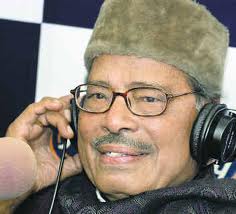BANGALORE, Oct 24: Legendary playback singer Manna Dey, who mesmerised generations of listeners with his inimitable voice for over five decades with hits like ‘ay mere pyara watan’, ‘laaga chunri me daag’ and ‘poocho na kaise’, died at a hospital here today at the age of 94 after prolonged illness.
Dey, who was in and out of Narayana Hrudayalaya Hospital in the last five months for respiratory and renal problems, died of cardiac arrest with his daughter Shumita Deb and son-in-law Jnanranjan Deb by his bedside when the end came at 3.50 AM.
The condition of Dey, who had made Bangalore his home for the last many years, deteriorated since yesterday afternoon, hospital spokesman Vasuki said.
With the demise of Dey, the void has become complete in the famous quartet of singers Rafi, Mukesh, and Kishore Kumar, who dominated the Hindi music industry from 1950s to 1970s.
The mortal remains of Dey, whose unique voice lent a rare dimension to his persona, were cremated at Hebbal crematorium here with Jnanranjan Deb performing the last rites with none from the Bollywood fraternity or government present.
Dey’s body was kept at Ravindra Kalakshetra for about two hours for paying homage amid criticism that arrangements were inadequate, before it was taken in a flower bedecked van to the crematorium. “He (Dey) had simple ideals… He wanted the last rites to be as simple as possible,” Shumita told reporters.
Dey, who had turned a recluse in the last years of his live, is survived by two daughters– the second living in US. His wife Sulochana predeceased him in January this year.
Dey, who rendered all-time hits like ‘zindagi kaisi hai paheli’ (Anand), ‘yeh dosti’ (Sholay) and ‘ek chatur naar’ (Padosan) and ‘yeh raat bheegi bheegi’ (Chori Chori), was equally at ease, be it romantic ballads, intricate raga-based songs, qawwalis and fast-paced modern numbers.
Born in Kolkata in 1919, Dey sang over 3,500 songs in Hindi, Bengali, Gujarati, Marathi, Malayalam, Kannada and Assamese films before quitting movies in the ’90s. His last song was ‘Hamari hi mutthi mein’ for 1991 film ‘Prahaar’.
As Dey’s voice captivated audiences, leaving his own imprints, awards flowed naturally to him, including titles like the National singer, Padmasree and Padmabhusan.
Dey started his career with the film “Tamanna” in 1943 with the musical score set by his uncle Krishna Chandra Dey. His duet with Suraiya ‘sur na saje kiya gaon mein’ became an instant hit.
In 1950, ‘Mashal’ was the second film where Dey got the opportunity to sing a solo ‘Upar gagan vishal’, a melody created by Sachin Dev Burman, and there was no looking back as the Bengali playback singer established himself in the years to come.
With mastery over classical numbers, Dey was much in demand for complicated raag-based songs that saw him once even pitted against his idol Bhimsen Joshi in 1956 movie ‘Basant Bahar’ for ‘Ketki, gulab, juhi’ song.
A meticulous singer, Dey would often prepare extensively before rendering a song.
“I am especially indebted to Shankerji, for had it not been for his patronage, I would certainly not have attained the heights of success I enjoyed in my career. Here was one man who knew how to bring out the best in me. In fact, he was the first music director who dared to experiment with my voice by making me sing romantic numbers,” Dey recalled in his autobiography ‘Memories Come Alive’.
The duo also helped Dey realise his dream of singing for lead actors in movies.
Dey recorded many popular duets with Rafi, Lata Mangeshkar, Asha Bhosle and Kishore Kumar. He gave some of his biggest hits with composers S D Burman, R D Burman, Shankar-Jaikishan, Anil Biswas, Roshan and Salil Chowdhury, Madan Mohan and N C Ramachandra.
Educated in Kolkata’s famed Scottish Church College and Vidyasagar College, Dey’s natural instinct for music manifested in school where he would sing to entertain friends, before he took it up seriously under the tutelage of his uncle.
Dey accompanied his uncle in 1942 on a visit to Mumbai and worked as his assistant and then under Sachin Dev Burman.
Born as Prabodh Chandra Dey in Kolkata, Dey was inspired by his youngest paternal uncle Krishna Chandra Dey, a known singer and actor of New Theatres company.
Manna, a name given to him by KC Dey, initially wanted to be a barrister but his uncle’s influence led him to a different destiny– a career in music. He took his first singing lessons from his uncle, Ustad Dabir Khan, Ustad Aman Ali Khan and Ustad Abdul Rahman Khan.
He referred to Sulochana Kumarana, who hailed from Kerala, as his inspiration. “She was everything in my life – the one I always consulted about my profession not to speak about my personal life as well.” (PTI)


